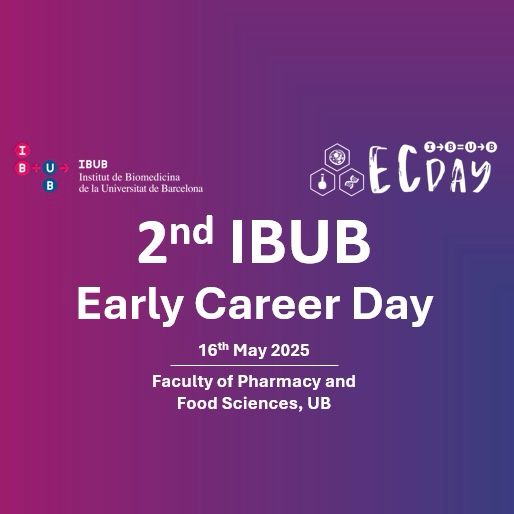IBUB
Institut de Biomedicina de la Universitat de Barcelona
Drug and target discovery for biomedical science
The Institute of Biomedicine of the University of Barcelona (IBUB) is a transversal research unit formed by some 40 groups from the Faculties of Biology, Chemistry and Pharmacy and Food Sciences. The IBUB was created in 2006 with the aim of identifying, beyond the traditional academic structures (departments and faculties), a set of laboratories with complementary scientific activity, capable of generating synergies.
Technology Transfer Opportunities
One of the key strengths of IBUB is its ability to successfully transfer knowledge to society
Projects
314
Research groups
40
Publications
725
Research
Glucocorticoid and Androgen Receptors Oligomerization: a Jigsaw Puzzle
Eva Estébanez-Perpiñá, de l’Institut de Biomedicina de la Universitat de Barcelona (IBUB)Date
December 2, 2024Time
13:00hPlace
Aula GrausAutomation + Miniaturization = Acceleration in Drug Discovery
Alex Dömling, Institute of Molecular and Translational Medicine, Palacky UniversityDate
February 13, 2025Time
12:30hPlace
A4, Fac. PharmacyLeveraging C. elegans in the drug discovery pipeline
Samantha Hughes, de la Faculty of Science, Environmental Health & Toxicology, Vrije Universiteit AmsterdamDate
March 28, 2025Time
12:00hPlace
Aula GrausArticle of the month
Diego Abad-Montero, Albert Gandioso, Eduardo Izquierdo-García, Sergi Chumillas, Anna Rovira, Manel Bosch, Mireia Jordà-Redondo, Davor Castaño, Joaquín Bonelli, Valentin V Novikov, Alba Deyà, José Luis Hernández, Jorge Galino, Marta E Alberto, Antonio Francés-Monerris, Santi Nonell, Gilles Gasser, Vicente Marchán
Journal of the American Chemical Society
Ruthenium(II) Polypyridyl Complexes Containing COUBPY Ligands as Potent Photosensitizers for the Efficient Phototherapy of Hypoxic Tumors
Hypoxia, a hallmark of many solid tumors, is linked to increased cancer aggressiveness, metastasis, and resistance to conventional therapies, leading to poor patient outcomes. This challenges the efficiency of photodynamic therapy (PDT), which relies on the generation of cytotoxic reactive oxygen species (ROS) through the irradiation of a photosensitizer (PS), a process partially dependent on oxygen levels. In this work, we introduce a novel family of potent PSs based on ruthenium(II) polypyridyl complexes with 2,2′-bipyridyl ligands derived from COUPY coumarins, termed COUBPYs. Ru-COUBPY complexes exhibit outstanding in vitro cytotoxicity against CT-26 cancer cells when irradiated with light within the phototherapeutic window, achieving nanomolar potency in both normoxic and hypoxic conditions while remaining nontoxic in the dark, leading to impressive phototoxic indices (>30,000). Their ability to generate both Type I and Type II ROS underpins their exceptional PDT efficiency. The lead compound of this study, SCV49, shows a favorable in vivo pharmacokinetic profile, excellent toxicological tolerability, and potent tumor growth inhibition in mice bearing subcutaneous CT-26 tumors at doses as low as 3 mg/kg upon irradiation with deep-red light (660 nm). These results allow us to propose SCV49 as a strong candidate for further preclinical development, particularly for treating large hypoxic solid tumors.
MCP Lab offers a predoctoral contract associated with a project of the AGAUR Program “Indústria del Coneixement”
Data límit
20/1/2024 - Send CV and motivation letterENDED- Call for 6 research initiation grants 2023-2024
Data límit
3 d'octubre 2023. Més informació: https://www.ub.edu/ibub/call-for-6-research-initiation-grants-2023-2024/ Convocatòria: https://seu.ub.edu/ajutsPublic/showPublicacion/441657Facultat de Biologia / Secretaria IBUB & Bioinformàtica
Avda. Diagonal, 643
Edifici Prevosti, planta -1
08028 Barcelona
+34 606 14 87 72
ibub@ub.edu







